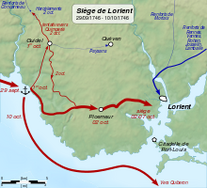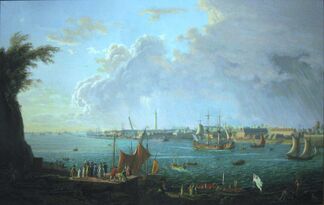Information[]
The Raid on Lorient was a British Naval operation of the coast of France during The War of Austrian Succession. The battle was an attempt to force France to withdraw their own forces from Flanders to reinforce their own coast. The problem was that Lorient was already occupied by the French East India Company as a base and supply depot.
Strength[]
The goal of a British victory seemed almost impossible. The British had only 4,500 troops with 16 ships of the line while the French had 4,000-6,000 members of the coast guard and local militia.

British Admiral of the Blue, Richard Lestock
The Raid[]
Led by British Admiral of the Blue, Richard Lestock and Major General of the Royal Marines James St. Clair, The British expedition sailed in September, reaching the French Atlantic coast shortly afterwards. The two commanders were uncomfortable with their orders, as they believed the operation to be extremely risky, and they lacked British intelligence about Lorient and its defenses. The British fleet arrived off Lorient in September after six days crossing the Channel and joined up with its vessels. Lestock chose the entry to the Lorient roads as his landing point due to his poor knowledge of Lorient's defences. The fleet started to anchor in Pouldu bay on the evening of September 29th. The British were lucky to have favourable weather, a full moon and a good wind blowing inshore. However, Lestock postponed the landing until the following day, leaving time for the French to prepare their defenses. The landing site presented the issue of being exposed to the wind, running the risk of running the ships against the shore if a storm blew up, whilst it was 16 miles away from Lorient.
The landing took place on Saturday October 1st after being cancelled due to lack of time the day before. The landing could not take place early in the morning due to unfavourable weather, allowing the Lorient coast-

Map layout of the Raid.
guards definitely to identify the fleet as British and not Mac Gemara's and allowed time to organise their defenses. The British forces approached three beaches and landed in groups between 400 and 1000 men under a bombardment from Lestock's ships.
The first available French forces were the coast-guards. There were also three companies of cavalry - with the coast-guards, this made a total of around 2,000 men under the command of marquis De L'Hôpital. Only two of the three beaches could be guarded effectively, and St Clair took advantage of his to land his troops. Since 1744 the French had been trained for 15 days each year, to be prepared for a sudden attack like the Raid of Lorient.
Aftermath[]
During the Raid, Admiral Lestock lost most of his troops to disease rather than military combat. At the same time, the French originally made the decision to surrender. The French commander made a surrender on October 7th, but never got a reply from the enemy resulting in a French victory. In the end, the Raid was viewed as a disappointment to Britain leaving Admiral Lestock humiliated by the whole ordeal and acquitted himself ultimately dying of a stomach ailment in December of 1746.
A Notable officer[]
In early September of 1746, a young Navy Lieutenant/ Royal Army Captain Thomas McWard, had just returned from fighting in the Jacobite Rising in Scotland. On August 29th he received a letter from Admiral

Lieutenant McWard leading a march at the Raid of Lorient (1746)
Lestock congratulating him for his bravery and victory at the battle of Culloden. He wrote McWard asking him to join his forces in France and help with the Raid. The young Lieutenant/Captain met up with the Admiral in Brittany to discuss the attack. Under the command of General James St. Clair, McWard was ordered to lead a squad into the town of Lorient. During the Raid of the town, St. Clair divided his troops into two squads, one was to head Plomeur, Brittney and the other was to head North to the town of Quimperle. McWard was given the command to lead the squad heading to Quimperle. The Puomeur squad arrived safely while McWard's squad was harassed

McWard (left) holding the defense at Lorient.
by 300 French militiamen coming from the town of Concarneau. Captain McWard quickly organized a successful retreat resulting in very little casualties. Impressed by this action, the Navy board promoted him to Lieutenant-Commander of the Royal Navy and Major of the Royal Army.

